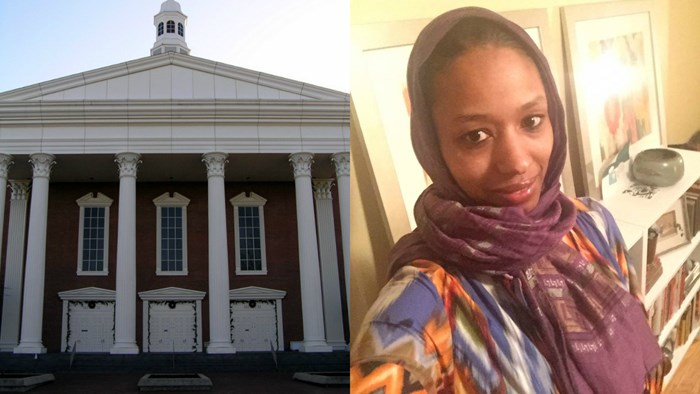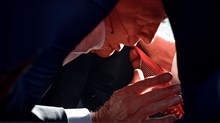
Wheaton College has published its final report on the “same God” controversy that culminated in its high-profile parting with tenured professor Larycia Hawkins.
In a 15-page Trustee Community Report released today “with a spirit of both lament and gratitude,” trustees reflect on a task force’s final findings of what went wrong and who bears responsibility. They also offer nine recommendations for how the Illinois school can improve, as well as eight prayers for what good can come of the controversy.
CT previously reported in January how many faculty asked Wheaton to drop its attempt to fire Hawkins over whether her views on Islam fit the school’s faith statement. This culminated in February with the surprise announcements that provost Stanton Jones had withdrawn his recommendation that Hawkins’s tenure be revoked, yet the associate professor of political science would still be leaving Wheaton after nine years of service.
Ever since, ”[we] have heard the heart cries of our college family about the issues that led to the parting of ways,” the trustees state in their final report. “We grieve over the pain and confusion caused by these events. … In particular, as our community is identified around the world with the name of Jesus Christ, we lament any ways that conduct and actions in our college family might have dishonored, rather than glorified, His name.”
Thus, the final findings have been published on the college’s website. “We find courage in the fact that our Father loves to bring broken things in his creation back together,” state the trustees. “We present this summary praying that it will further His renewing and restorative work among us.”
Wheaton’s review task force conducted 47 face-to-face-interviews and reviewed hundreds of emails, social media comments, transcripts, and other documents since February 24. It involved “15 individuals of varying backgrounds and perspectives, which included eight trustees, three faculty members, one staff member, one student leader, one alumni leader, and one external global church leader.”
Hawkins declined to participate in Wheaton’s review, according to the report. “We humbly acknowledge that without her essential voice to interpret primary source material, the Review Task Force was required to focus its review on actions of the administration, faculty and staff,” state the trustees.
They noted:
This examination was a process of deep personal and shared reflection and humility, and we hope that this report will be received with a similar attitude of Biblical lament, faithful prayer, forgiveness, self-examination and grace. We acknowledge the benefit of hindsight and recognize that rapidly unfolding events and media attention in December 2015 and January 2016 created a chaotic environment in which to respond. And we confess to being as fully human as all those involved and accept responsibility for mistakes made as the individuals tasked with stewarding this institution.
Here are some highlights of what trustees concluded:
- Trustees and the task force found “no evidence” that Wheaton faculty are “wavering in their commitment to the Statement of Faith, Community Covenant, and mission of the College.”
- Trustees “recognize that broad theological statements understood one way within the academy may be understood quite differently in the general public, and can become fractured across a complex social media landscape.”
- The task force did not determine whether Hawkins’s theological beliefs align with Wheaton’s statement of faith because it “was not asked to review [it]” and its “assessment was limited by lack of opportunity to interview her.”
- President Philip Ryken has initiated a task force to “produce a theological and missiological statement on Christianity and Islam that will engage the Wheaton community in the kind of dialogue in which it serves the church and society.”
- The task force “found no intentional racial or gender-based discrimination” in how the college treated Hawkins, but acknowledges concerns that “unconscious bias and unintentional partiality may have been present in areas of both race and gender.”
- Trustees agree that “although [provost Jones] exercised his position of faculty oversight within the bounds of college employment policies and procedures,” his decision to engage Hawkins “indirectly through an intermediary lacked wisdom and collegiality.”
- Trustees also agreed that “placing Dr. Hawkins on administrative leave at the conclusion of their first face-to-face meeting was an error in judgment” by Jones, and that “publicly announcing the imposition of administrative leave exacerbated the conflict and was distressing to Dr. Hawkins.”
Trustees also offered a final summary of how college administrators treated Hawkins:
We affirm the President and Provost’s pursuit of theological conversation with Dr. Hawkins concerning her Facebook posts as well as her written theological response to the Provost’s questions. The Review Task Force and the Trustees affirm that the confessional identity of Wheaton College made it necessary to engage Dr. Hawkins about these statements – and especially those about human origins and the relationship between Christianity and Islam. We note that the College did not oppose Dr. Hawkins’ decision to wear a hijab during Advent and commended her gesture of care for Muslims in the face of discrimination. While her Facebook posts and media interviews seemed primarily intended to invite others to join her in this gesture of solidarity with Muslims who were unfairly associated with violent terrorist acts, her theological statements in support of this solidarity could be interpreted in ways that were inconsistent with the College’s Statement of Faith.
While Dr. Hawkins did submit written responses to the Provost's initial questions, she declined to engage in further theological conversation creating an impasse between her and the administration. Furthermore, the mediated agreement between Dr. Hawkins and the College to separate ended the process to determine whether her theological views were consistent with the Statement of Faith.
…
We find Provost Jones’ apology offered to Dr. Hawkins on February 3, 2016 identifies many of the actions of the administration that we regret and wish to learn from going forward. President Ryken agrees that as President of the institution, these regrettable actions happened under his leadership. As Provost Jones’ immediate supervisor, more direction of the Provost might have avoided some of these difficulties. The President could have engaged his cabinet more deeply and encouraged the Provost to seek more counsel from his own senior academic leaders and the Director of Human Resources in the early days of the incident. However, President Ryken’s active engagement with Dr. Hawkins following the Notice of Termination effectively facilitated a resolution of the conflict. Following the mediated agreement to part ways, his emphasis on lament in acknowledging the pain experienced by the community set a gracious and appropriate tone for both the reconciliation service at the College and the press conference in Chicago.
Trustees arrived at nine recommendations, which Ryken agreed to have his administration implement:
1. The administration should lead the campus through a period of reconciliation and healing by reviewing this report with faculty, staff and students and collaborating with appropriate groups in implementing its recommendations with humility and grace.
2. The administration will collaborate with faculty, staff and students to produce a theological and missiological statement on Christianity and Islam, to be approved by the Board of Trustees.
3. The faculty, in collaboration with the administration, will review and revise the Faculty Handbook to clarify or address the following items, presenting changes or additions to the Board of Trustees for approval.
a. Clear articulation of the practice of shared governance.
b. Protocols for the administration to discuss Statement of Faith boundary concerns with tenured and non-tenured faculty. For tenured faculty, such protocols would begin prior to initiating a formal Termination for Cause proceeding.
c. Expectations for modeling the Statement of Faith.
d. Development of guidelines with respect to the use of social media, with particular clarification for faculty on issues of academic freedom in this context.
e. A robust mandate and clear operational guidelines for the Faculty Council, the Faculty Diversity Committee, and all other committees under Faculty Council purview.
f. Additional guidelines for the administration and Faculty Personnel Committee in conducting a formal Termination for Cause proceedings, giving particular attention to empowering Presidential leadership and addressing conflict of interest considerations.4. The Board of Trustees and administration should devote time and resources to developing and implementing a plan with specific goals for deepening ethnic diversity. Given the abundant research suggesting that each of us practices some degree of unintentional 13 partiality, such a plan will include guidance in how to develop skill in identifying, understanding and overcoming unconscious bias for our campus community.
5. The Employee Handbook should be reconciled with the Faculty Handbook and any contradictions resolved in consultation with human resources. These handbooks should include a strong policy statement prohibiting the public release of personnel documents and private e-mail, correspondence and documents between members of the College community without consent.
6. A clear protocol should be put in place for how senior administrators and Deans will conduct or implement all personnel actions related to faculty in the Employee Handbook. Human Resources should be consulted in personnel matters in which policies and procedures in the Employee Handbook are applied to faculty.
7. Meeting the new challenges accompanying social media will require us to develop better communal practices as well as developing a particular social media policy. The administration should encourage campus-wide reflection on character-formation and wise engagement with social media, as well as developing a clear Social Media Policy for faculty, staff and students, in consultation with each of these groups. These policies should reflect principles from the Community Covenant and include periodic education and reevaluation.
8. The administration should enhance significantly capabilities for timely crisis management and responsive communications with faculty, staff, students, alumni and the general public through traditional and social channels.
9. The administration should ensure that training in effective communication and conflict management skills are available for administrators, faculty and staff.
Trustees also offered eight prayers for areas where they hope “understanding and growth” will result:
1. All constituents will know that Wheaton College’s unashamed commitment to orthodox Christian faith, as expressed in our Statement of Faith -- including the nature of the God we worship (article 1), the Book that is our “supreme and final authority” (article 2), and the uniqueness of Jesus Christ who is our Lord (article 3) -- is unequivocal and unambiguous;
2. We will become more effective in our mission to serve the world, in all its kingdom breadth and diversity, through the church;
3. We will develop improved ways to be unified in adherence to our Statement of Faith, lived out in keeping with our Community Covenant and, at the same time, nurture and encourage freedom in academic inquiry, teaching, research and publishing;
4. We will have greater clarity about how to approach and process uncertainties surrounding the relationship of the Statement of Faith and Community Covenant to academic freedom;
5. We will implement necessary improvements to our practices and protocols that will benefit the College, including many that will be clarified and strengthened in order to serve our community better in the future;
6. Our entire community will gain insight from these events about utilizing ever-changing communication technologies like social media to bring about good rather than harm;
7. Relationships that have been broken due to these events might find the kind of reconciliation and restoration both commanded by the Scriptures and made possible by the Holy Spirit who dwells in and among us; and
8. Trustees and President will have humility and wisdom to learn from these events to lead more effectively towards God’s call upon Wheaton College.
“While we lament the wounds that remain in our community,” state the trustees, “[we] retain a firm commitment to the mission of Wheaton College, a dedication to theological orthodoxy, a commitment to fair and transparent processes, and an ongoing mandate to deepen ethnic diversity in our institution.”
“The God we worship has revealed himself as being ‘gracious and compassionate, slow to anger and rich in love’ (Ps 145:8), and He forgives and heals those who turn to him in repentance and faith (Ps 103:3),” state the trustees. “Indeed, God does much of his perfecting work in his people through lessons in trials (Js 1:4). As Trustees, we are praying humbly and fervently that God will use what some have called a ‘perfect storm’ to do his perfecting work through and among our college community.”
The college offers an online form where people can submit “questions, comments, and concerns” about the report. It notes: “While [trustees] will not be able to respond to every comment, your perspective will be taken into consideration.”
In addition to reporting how Wheaton and Hawkins were reconciled yet parting ways, CT previously noted what evangelical experts on missions and Muslims think of the “same God” debate, as well as the views of Arab evangelical leaders. CT also editorialized on how Wheaton and Hawkins should reason together, and editor Mark Galli shared his torn feelings over the outcome.
[Wheaton College image courtesy of Stevan Sheets / Flickr]
[Larycia Hawkins image courtesy of Facebook

Support Our Work
Subscribe to CT for less than $4.25/month

















